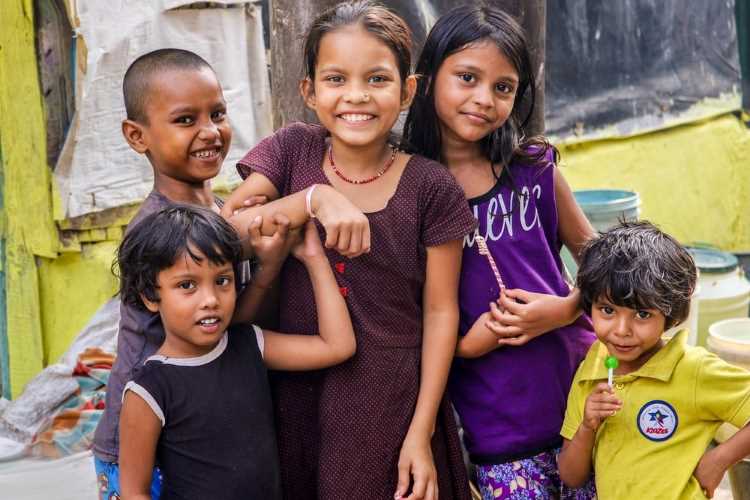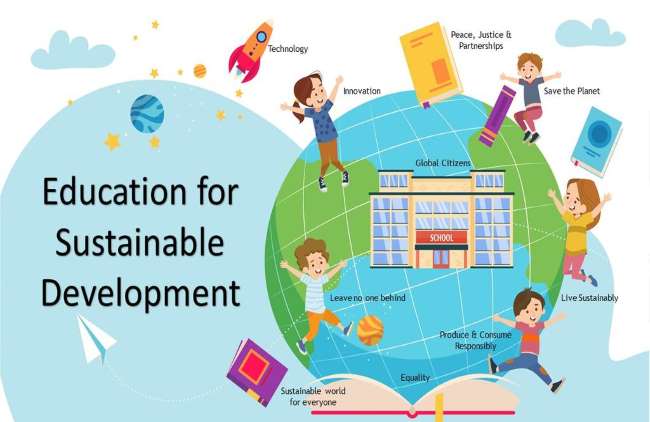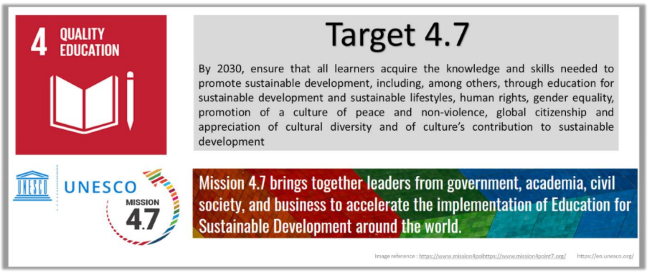
Education for Sustainable Development: Thanks to the Covid-19 pandemic, the terms “sustainability” and “sustainable development” have finally started resonating to a large number of people, enterprises and governments. Decades ago, sustainable development was defined as one that meets present needs without compromising the future generations’ ability to meet their’s. The United Nation’s 17 Sustainable Development Goals (SDG 2030) have given the world the most crystallised and globally accepted dimensions of sustainability for every entity to contextualise and embrace it at its core.
In all, 193 countries have signed up to deliver SDGs as the goals for humanity. If delivering SDGs is fundamental to humanity, the purpose, goals and actions of international organisations, governments, corporates, communities and individuals also must align. That makes “Education for Sustainable Development” (ESD) pivotal to the human resource development efforts across the globe.
READ I ESG reporting: Did the Big Four and the World Economic Forum crack it?

What is Education for Sustainable Development?
Education for Sustainable Development is commonly defined as the development of knowledge, skills, values and behaviour required to create a sustainable world. It is important to note that it is not the education about sustainable development, but the education for sustainable development.
ESD in simpler terms is the education that —
▪ Empowers one to claim and respect equality, peace and social justice
▪ Builds the knowledge and skills to create a sustainable world for everyone
▪ Inculcates the attitude to leave no one behind
▪ Reminds us constantly that we have only one planet, it belongs to all its inhabitants equally and that we have oversubscribed the resources beyond what is rightfully ours
▪ Teaches responsible consumption and production
▪ Delivers sustainable economic growth
▪ Advocates global citizenship
▪ Fosters innovation and abundance towards a sustainable world
READ I The New Education Policy: Twenty ideas that will shape India’s education system
ESD gains global recognition, rides on SDG 2030 targets
UNESCO reflects the growing international recognition of Education for Sustainable Development as an integral element of quality education and a key enabler for sustainable development. UNESCO is responsible for the coordination of the SDG aligned ESD for 2030 framework, which is expected to be launched this year. SDG 4 pertains to quality education and target 4.7 of SDG 4 addresses ESD. Mission 4.7 is a joint initiative of UNESCO, launched in December 2020 with a purpose of accelerating the implementation of SDG target 4.7.

National Education Policy lays out vision on ESD fundamentals
India’s National Education Policy (NEP 2020), the first education policy of the 21st century, aiming to transform India’s education system is timely in its release and response to the global goals and momentum on SDG 4. The NEP is expected to put India on track to attain SDG 4 of the 2030 agenda for sustainable development by offering inclusive and equitable education and assuring lifelong learning opportunities for everyone. NEP acknowledges that achieving SDG 4 will require the entire education system to be reconfigured to achieve all critical targets and SDGs.
READ I Future of commuting: Are we heading to a world without cars?
Let us take a look at the vision and guidelines NEP sketches around sustainable development, particularly addressing Education for Sustainable Development and Target 4.7.
▪ The vision of the policy states to instil, among other aspects, developing knowledge, skills, values, and dispositions which support commitment to human rights, sustainable development, and global well-being.
▪ Holistic and multidisciplinary education environment to include areas such as climate change, pollution, waste management, sanitation, conservation and management of biological resources, biodiversity, wildlife and forest, and sustainable development and living.
▪ Teacher education to appropriately integrate environmental awareness and sensitivity towards conservation and sustainable development, so that environment becomes part of school curricula.
▪ Higher education to significantly contribute towards sustainable livelihoods and economic development of the nation.
▪ As the world is becoming increasingly interconnected, Global Citizenship Education (GCED), a response to contemporary global challenges, should be offered enabling learners to become aware of, appreciate global issues and to become active advocates of communities that are more peaceful, compassionate, inclusive, healthy and sustainable.
▪ Professional education to take the lead in preparing professionals in cutting-edge areas such as Artificial Intelligence (AI), 3-D machining, big data analysis, machine learning, genomic studies, biotechnology, nanotechnology, and neuroscience, with their applications to health and sustainable living that will be woven into undergraduate education for enhancing the employability of the youth.
▪ Technology use and integration to change the way we live, and, therefore, change the way we educate students.
The implementation of this Policy will be led by various bodies including Ministry of Human Resource Development (MHRD), Central Advisory Board of Education (CABE), Union and State Governments, Boards, National Testing Agency (NTA), National Council of Educational Research and Training (NCERT), State Council of Educational Research and Training (SCERTs), schools, and Higher Education Institutions (HEIs).
NEP lays out an action plan with milestones to be achieved by 2022, 2025 and 2030. Union budget 2021 plans for NEP implementation in 2022-23 timeframe in 15,000 schools who can mentor other schools subsequently. It is imperative to prioritize and implement the NEP in a gradual manner.
As we can see, ESD is gaining a lot of momentum globally and nationally as we speak. While we wait for ESD 2030 framework to be launched, best practices and guidance to be crystallised by Mission 4.7 and as NEP gets further elaborated to crisp curriculum and methodology and reaches every institution and learner, the entire ecosystem could take up several preparatory and progressive steps that will keep them ahead in the journey.
READ I Changes to Arbitration law may open a can of worms
Educational Institutions, start your ESD journey today
It seems overwhelming to mobilise ourselves and our society to take on the greatest obstacles to global well-being. Tools and systems must be designed to help learners and educators get involved at the local, national and international level. Educational institutions can nurture teachers’ and students’ curiosity and provide them with the tools and resources to inquire, understand, engage and communicate the importance of sustainability.
Educational institutions must proactively start their preparations to embrace Education for Sustainable Development, while NEP prepares to roll out. Educators must leverage this interval to:
Prepare
- Build Awareness among management, teachers and students.
‒ Understanding sustainability
‒ SDGs and its significance in the life of individuals, schools, community,
corporates, and governments
‒ ESD, why and how? the role of schools, teachers and students
‒ NEP direction and plan - Host a documentary screening.
- Start an awareness campaign.
- Conduct interdisciplinary seminars overlapping with the sustainability concepts. Discuss various indicators with students for example, how would our lives change if we do not achieve “Net Zero” emission by 2050?
- Engage students and establish the culture of sustainability, enable them to see sustainability in everything they do; Develop creative games, thought-provoking idea build-up through shark-tank like concepts, , comics, of indicators and its key elements, ask students to make short videos and share vlogs.
Practice
- Take an ESG (Environmental, Social and Governance) audit.
- Define what it takes to become a “Sustainable School”. Define projects and milestones and engage ALL students to deliver them. Every stakeholder of the school has its responsibility to deliver.
- Define and practice a “Sustainability Index” and let the student groups compete to improve their index.
- Conduct Sustainability Day.
- Formulate an integrative conceptual learning framework, include concepts in interdisciplinary content and define your education methods.
- Conduct programs for upgrading teachers’ skills and transition assistance programs
Collaborate / Network
- Conduct interschool events on the sustainability theme.
- Continue to develop greater synergies between ESD and every other education attribute.
- Build greater collaboration between the department of education and other key stakeholders.
- Leverage the role and potential of regional and national networks and third-party players.
- Take up ongoing community projects targeting to deliver a specific SDG.
- Join hands with corporates in community projects.
READ I Labour reforms: What do the four labour codes mean to businesses, workers
Sustainability is significantly influencing the way we conduct ourselves, be it governments, international organizations, corporates, communities, investors or individuals. Purpose, vision, strategy, products, services, lifestyles and behaviour are being revisited for sustainability like never before. Education is the superpower and our most impactful lever that seeds concepts as a culture at one’s core and brings the change we need at a scale we need.
As educators of the future generation, the onus is on each one of us, the government, our leaders, boards, foundations, educational institutions, teachers, communities, parents and individuals to work together towards building a sustainable world. We have a clear opportunity to take the lead, differentiate with purpose and deliver significant impact. Are you geared up to embrace the change and evolve in this journey?
(Nalini Harit is a school safety and security consultant based in Mumbai. She is also director and cofounder, Campus Fortify Pvt Ltd. Thara TK specialises in corporate strategy, governance, ESG and sustainability. She is a qualified independent director.)
Thara TK is a renowned expert in sustainability and technology. She is the founder of ESG Minds.


